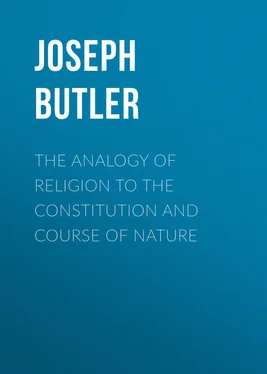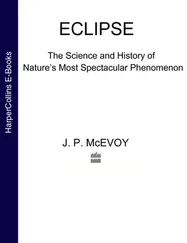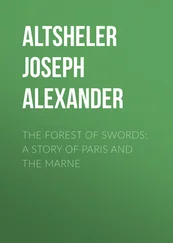Joseph Butler - The Analogy of Religion to the Constitution and Course of Nature
Здесь есть возможность читать онлайн «Joseph Butler - The Analogy of Religion to the Constitution and Course of Nature» — ознакомительный отрывок электронной книги совершенно бесплатно, а после прочтения отрывка купить полную версию. В некоторых случаях можно слушать аудио, скачать через торрент в формате fb2 и присутствует краткое содержание. Жанр: foreign_antique, foreign_prose, на английском языке. Описание произведения, (предисловие) а так же отзывы посетителей доступны на портале библиотеки ЛибКат.
- Название:The Analogy of Religion to the Constitution and Course of Nature
- Автор:
- Жанр:
- Год:неизвестен
- ISBN:нет данных
- Рейтинг книги:3 / 5. Голосов: 1
-
Избранное:Добавить в избранное
- Отзывы:
-
Ваша оценка:
- 60
- 1
- 2
- 3
- 4
- 5
The Analogy of Religion to the Constitution and Course of Nature: краткое содержание, описание и аннотация
Предлагаем к чтению аннотацию, описание, краткое содержание или предисловие (зависит от того, что написал сам автор книги «The Analogy of Religion to the Constitution and Course of Nature»). Если вы не нашли необходимую информацию о книге — напишите в комментариях, мы постараемся отыскать её.
The Analogy of Religion to the Constitution and Course of Nature — читать онлайн ознакомительный отрывок
Ниже представлен текст книги, разбитый по страницам. Система сохранения места последней прочитанной страницы, позволяет с удобством читать онлайн бесплатно книгу «The Analogy of Religion to the Constitution and Course of Nature», без необходимости каждый раз заново искать на чём Вы остановились. Поставьте закладку, и сможете в любой момент перейти на страницу, на которой закончили чтение.
Интервал:
Закладка:
10
See Part II. chap. vi. Конец ознакомительного фрагмента. Текст предоставлен ООО «ЛитРес». Прочитайте эту книгу целиком, купив полную легальную версию на ЛитРес. Безопасно оплатить книгу можно банковской картой Visa, MasterCard, Maestro, со счета мобильного телефона, с платежного терминала, в салоне МТС или Связной, через PayPal, WebMoney, Яндекс.Деньги, QIWI Кошелек, бонусными картами или другим удобным Вам способом.
11
Philocal. p. 23, Ed. Cant.
12
[Some of these speculations, carried to the full measure of absurdity and impiety, may be found in Bayle’s great “Historical and Critical Dictionary.” See as instances, the articles Origen, Manichæus, Paulicians.]
13
Ch. i.
14
Ch. ii.
15
Ch. iii.
16
Ch. iv.
17
Ch. v.
18
Ch. vi.
19
Ch. vii.
20
Part II. Ch. i.
21
Ch. ii.
22
Ch. iii.
23
Ch. iv.
24
Ch. v.
25
Ch. vi. vii.
26
Ch. viii.
27
[This chapter Dr. Chalmers regards as the least satisfactory in the book: not because lacking in just analogies, but because infected with the obscure metaphysics of that age. His reasoning, however, only serves to show that B. has perhaps made too much of the argument from the indivisibility of consciousness; and by no means that he does not fairly use it.
28
I say kind of presumption or probability; for I do not mean to affirm that there is the same degree of conviction, that our living powers will continue after death, as there is, that our substances will.
29
Destruction of living powers , is a manner of expression unavoidably ambiguous; and may signify either the destruction of a living being, so as that the same living being shall be incapable of ever perceiving or acting again at all ; or the destruction of those means and instruments by which it is capable of its present life, of its present state of perception and of action . It is here used in the former sense. When it is used in the latter, the epithet present is added. The loss of a man’s eye is a destruction of living powers in the latter sense. But we have no reason to think the destruction of living powers, in the former sense, to be possible. We have no more reason to think a being endued with living powers, ever loses them during its whole existence, than to believe that a stone ever acquires them.
30
[The next paragraph indicates that Butler does not, as Chalmers thinks, consider this argument as “handing us over to an absolute demonstration.” It just places all arguments for and against the soul’s future life, in that balanced condition, which leaves us to learn the fact from revelation, free from presumptions against its truth. This view of the case entirely relieves the objection as to the future life of brutes; and shows how entirely we must rely on revelation, as to the future, both of man and beast.]
31
[Dodwell had published a book, in which he argues that human souls are not naturally immortal, but become so, by the power of the Holy Ghost, in regeneration. Dr. Clarke replied. The controversy was continued by Collins. Dr. C. wrote four tracts on the subject.These “presumptions” form the base of materialism, and hence the denial of a future state. Surely, thoughts and feelings, if material, have extension. But can any one conceive of love a foot long, or anger an inch thick? How superior to the gloomy mists of modern infidels have even pagans been! Cicero makes Cato say, “The soul is a simple, uncompounded substance, without parts or mixture: it cannot be divided, and so cannot perish.” And in another place, “I never could believe that the soul lost its senses by escaping from senseless matter; or that such a release will not enlarge and improve its powers;” and again, “I am persuaded that I shall only begin truly to live, when I cease to live in this world,” Xenophon reports Cyrus as saying, in his last moments, “O my sons! do not imagine that when death has taken me from you, I shall cease to exist.”]
32
See Dr. Clarke’s Letter to Mr. Dodwell, and the defences of it.
33
[As every particle of our bodies is changed within seven years, an average life would take us through many such changes. If the mind changes with the body, it would be unjust for an old man to be made to suffer for the sins of his youth. To escape this, the materialist is driven to affirm that the whole is not altered, though every particle be changed.This argument from the constant flux is irresistible. It proves our identity, and that matter and mind are not the same. Does it not also destroy all presumption that the Ego cannot exist without this particular body?]
34
See Dissertation I.
35
[The mind affects the body, as much as the body does the mind. Love, anger, &c. quicken the circulation; fear checks it; terror may stop it altogether. Mania is as often produced by moral, as by physical causes, and hence of late moral means are resorted to for cure. The brain of a maniac, seldom shows, on dissection, any derangement. But this does not prove that there was no functional derangement.]
36
[“S. What shall we say, then, of the shoemaker? That he cuts with his instrument only, or with his hands also? A. With his hands also. S. Does he use his eyes also, in making shoes? A. Yes. S. But are we agreed that he who uses, and what he uses, are different? A. Yes. S. The shoemaker, then, and harper, are different from the hands and eyes they use? A. It appears so. S. Does a man then use his whole body? A. Certainly. S. But he who uses, and that which he uses are different. A. Yes. S. A man then is something different from his own body.” Plat. Alcibi. Prim. p. 129, D. Stallb. Ed.“It may easily be perceived that the mind both sees and hears, and not those parts which are, so to speak, windows of the mind.” “Neither are we bodies; nor do I, while speaking this to thee, speak to thy body.” “Whatever is done by thy mind, is done by thee.” Cicero, Tusc. Disput. I. 20, 46 and 22, 52.“The mind of each man is the man; not that figure which may be pointed out with the finger.” Cic., de Rep. b. 6, s. 24.]
37
[Butler’s argument, if advanced for proof would prove too much, not only as to brutes but as to man; for it would prove pre-existence. And this is really the tenet, ( i. e. transmigration,) of those who arrive at the doctrine of immortality only by philosophy. Philosophy cannot establish the doctrine of a future state, nor can it afford any presumptions against either a future or a pre-existent state.Nothing is gained by insisting that reason teaches the true doctrine of the soul; any more than there would be by insisting that by it we learned the doctrine of a trinity, or atonement. Philosophy does teach that He who can create , under infinite diversity of forms, can sustain existence, in any mode he pleases.The reader who chooses to look further into the discussion as to the immortality of brutes, will find it spread out in Polignac’s Anti-Lucretius, and still more in Bayle’s Dictionary, under the articles Pereira, and Rorarius. The topic is also discussed in Des Cartes on the Passions: Baxter on The Nature of the Soul: Hume’s Essays, Essay 9: Search’s Light of Nature: Cheyne’s Philosophical Principles: Wagstaff on the Immortality of Brutes: Edwards’ Critical and Philosophical Exercitations: Watt’s Essays, Essay 9: Colliber’s Enquiry: Locke on the Understanding, b. 2, ch. ix.: Ditton on the Resurrection: Willis De Anima Brutæ.]
Интервал:
Закладка:
Похожие книги на «The Analogy of Religion to the Constitution and Course of Nature»
Представляем Вашему вниманию похожие книги на «The Analogy of Religion to the Constitution and Course of Nature» списком для выбора. Мы отобрали схожую по названию и смыслу литературу в надежде предоставить читателям больше вариантов отыскать новые, интересные, ещё непрочитанные произведения.
Обсуждение, отзывы о книге «The Analogy of Religion to the Constitution and Course of Nature» и просто собственные мнения читателей. Оставьте ваши комментарии, напишите, что Вы думаете о произведении, его смысле или главных героях. Укажите что конкретно понравилось, а что нет, и почему Вы так считаете.












